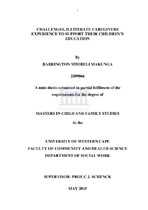Challenges, illiterate caregivers experience to support their children’s education
Abstract
Primary Caregiver’s ability to provide a healthy, nurturing and stimulating environment is critical, but Caregivers in South Africa, especially those living in rural communities, are facing many challenges, including a combination of poverty, lack of education and skills, as well as social isolation, which directly and indirectly affect their ability to care for their children in a way to ensure their optimal developmental outcomes. Residents in far rural communities, such as in the Eastern Cape, have had less opportunities to go to school, due to various reasons and Caregivers therefore face multiple burdens. For the purposes of this study, it is important to clarify with reference the term “Caregiver”. The South African Children’s Act (Act 38 of 2005) differentiates between biological parents, guardians and caregivers. According to the Act (Children’s 2005), parents may be a biological father or biological father, a guardian being an honorary parent to the child and a caregiver is any family member rather than the biological parent or guardian who is concerned with care, welfare and development of the child. Although there is such differentiation, caregiving remains central to the holistic care required of any adult responsible for the nurturing of children. This will include biological father, mother, grandparents, extended family members, brothers and sisters, aunts and uncles as well as any person who is concerned with the care, welfare and development of the child and has been, after application to court of law, granted permission to exercise parental responsibilities over the child. The population for this study encompassed caregivers who are least educated and or never attended school in the Ku-Jonga rural settlement in Coffee bay and research participants were purposively selected from the populations. Data was collected by means of focus groups with the aid of an interview guide. The interviews were conducted in Xhosa and later translated into English. A Thematic system was used according to the Tesch’s eight steps and ethical considerations such as voluntary participation, informed consent and confidentiality were adhered to. The community has most citizens who identified with the target population. This is based on historical factors. The participants freely expressed themselves and contributed to the findings and thereby assisting the researcher reach the conclusions about experiences illiterate caregivers experience to support their children’s education.

